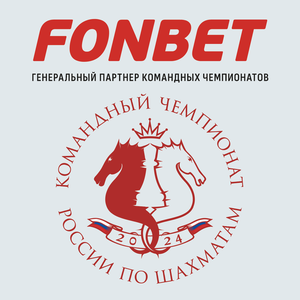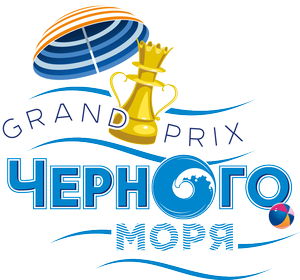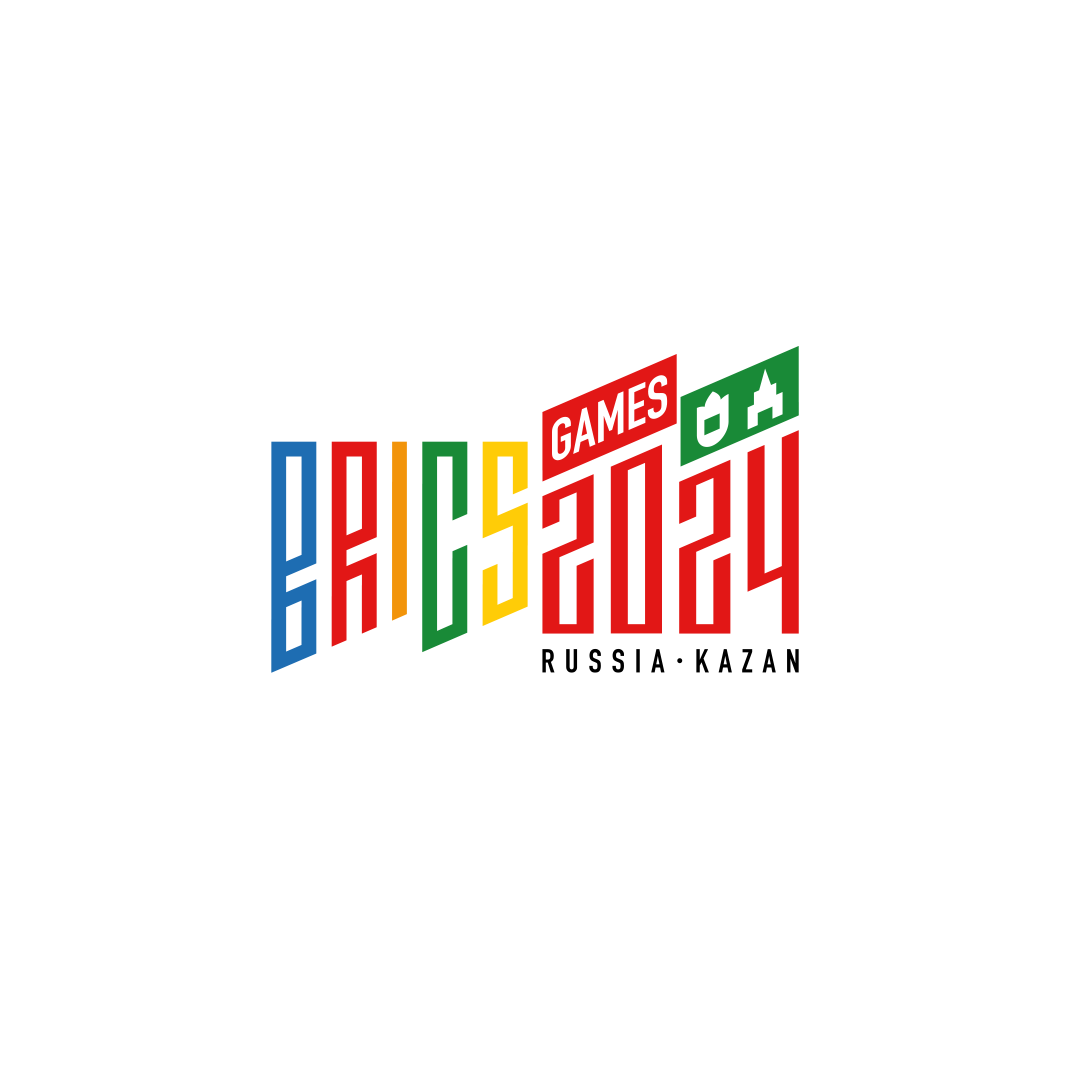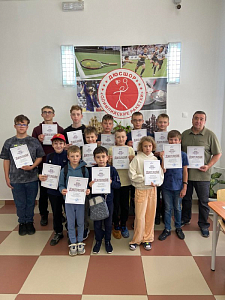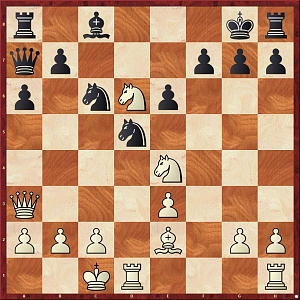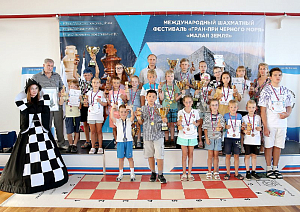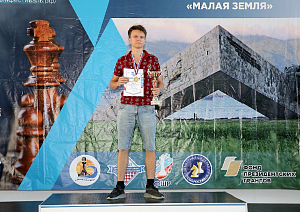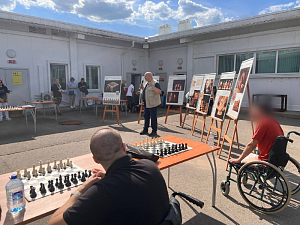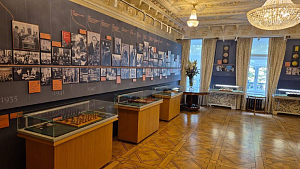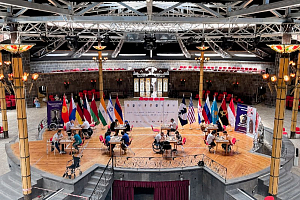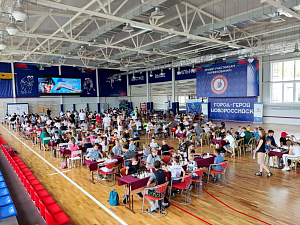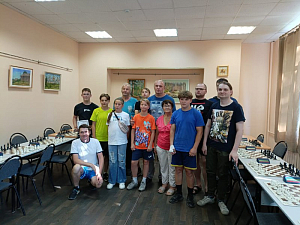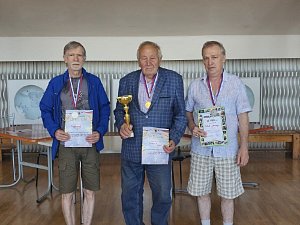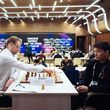Turbulence Zone and Flying to Cosmos
Dmitry Kryakvin gives you more of the Aeroflot Open history
2011. Anniversary year
The tenth edition of Aeroflot Open finalized changes in the festival structure: there is no more "A2" tournament, the "B" group is now for chess players rated between 2550 and 2300, and the "C" tournament admits chess players rated up to 2300.
Unfortunately, the notes of celebration came along with the notes of alarm. The new administration of Aeroflot started to improve the economic efficiency of the company, and rumors began to circulate that the festival was hanging by a thread. However, the organizers, backed up by the Russian Chess Federation, did not give up and managed to convince their partners to continue the flagship tournament. One of the strongest Russian GMs spoke well on the subject: "It is much easier to throw away than to create, promote such tournaments and gradually win the respect of its participants" (Evgeny Tomashevsky). And, fortunately, the flight continued.
That year the younger generation came forward – Daniil Dubov, Ivan Bukavshin (1995-2016) and Vladimir Fedoseev, who were included in the main tournament, showed excellent play despite the lack of rating.
After losing at the start, Nikita Vitiugov of St. Petersburg delivered a series of wins but ended up with the "silver" as the victory went to Vietnam's Le Quang Liem for the second year in a row. Aero's history knows winning twice, but winning twice in a row is definitely a record!
At the closing ceremony Le Quang Liem expressed his desire to win again next year, and in an interview he added that he likes Russian soups and salads, and that his chess skills have been greatly improved by studying with Russian GMs Evgeny Bareev (now this famous grandmaster is a representative of Canada) and Alexander Khalifman.
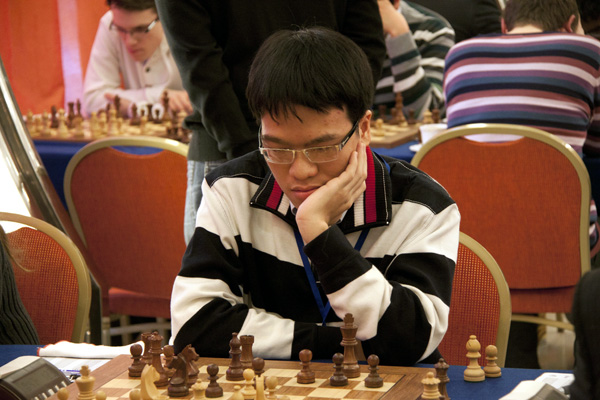
Kobalia – Le Quang Liem
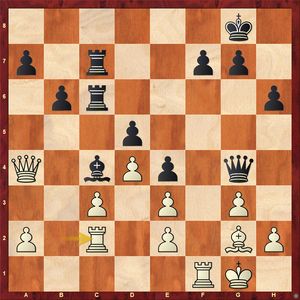
White's pieces are tied to defending weaknesses, the bishop is passive and the Vietnamese launches a decisive attack – 27...g5! 28.Kf2 h5! White resigned, unable to defend his king.
It did not do without the now traditional Blitz – the top six qualified into the World Blitz Championship, and it was Shakhriyar Mamedyarov who ended up winning.
2012. The king in exile sends his greetings!
Fortunately, the next season saw Aeroflot Open take place again! But there was one change: The festival moved to a new hotel, the third one in the history of the festival. It was the "Cosmos" - a monumental project built in the years 1976-1979 especially for the reception of the foreign guests of the capital city. Specialists from France came to help with the extensive construction. Using all the latest technology, the building was completed in record time for that era. On the grounds of the hotel, there is an eight-meter-high monument to the eternal leader of France and hero of the Resistance, Charles de Gaulle, ironically known in his homeland as the "King in Exile" because of his manner and the well-known facts of his biography.
The ribbon was cut with great pomp in 1979. The Soviet singer Alla Pugacheva and the French singer Joe Dassin, very popular in our country, sang at the opening ceremony. During the 1980, the Cosmos was the press center of the Olympic games.
So, the first prize of "Aero-2012" was 20 thousand euros and a traditional ticket to Dortmund – the Polish grandmaster Mateusz Bartel managed to defeat his geographical neighbors Anton Korobov and Pavel Eljanov in the struggle for victory. It turned out that the tournament winner speaks and reads Russian very well. He learned the language from one of his first coaches, Viktor Zheliandinov (1935-2021), and one of Bartel's favorite literary works was Dostoyevsky's “Crime and Punishment”. In the decisive game, Bartel defeated the chess player who would soon be a contender for the world champion title.
Bartel – Caruana
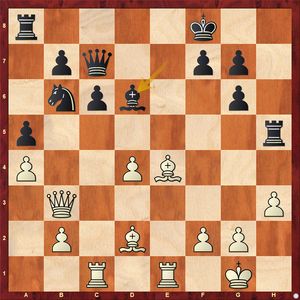
20.Qf3! N:a4?
Fabiano didn't like that after 20...Kg8 21.B:c6 bc 22.R:c6 Rf5 23.Qe4 Bh2+ 24.Kh1 White wins back a piece and remains up material, but the reality was much harsher.
21.B:g6 Rh8
After 21...Rd5 22.Bc2 Nb6 23.Re4 the rook helps White to attack the enemy king decisively.
22.Bg5 Black resigns, unable to defend against the e7 invasion with the subsequent f7 mate.
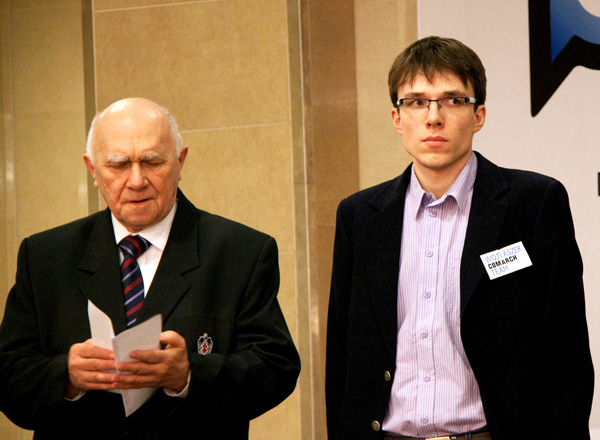
The winner of Group B was Emre Can (Turkey), and the winner of the Region Blitz tournament was once again Sergey Karjakin. Already in 2012 he was one of the main members of the Russian national team and on his way to the World Championship match.
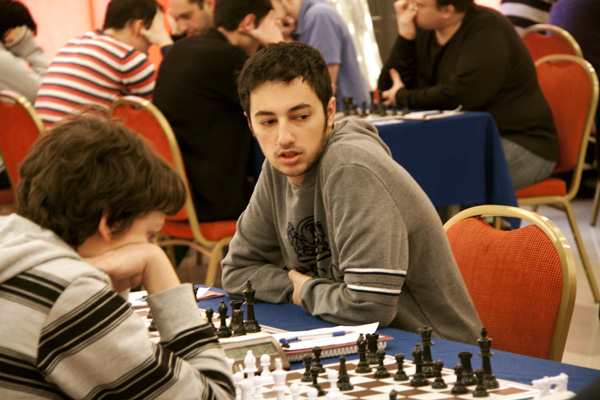
FIDE was introducing ratings in non-classical chess and the Region was actually the first rated blitz tournament.
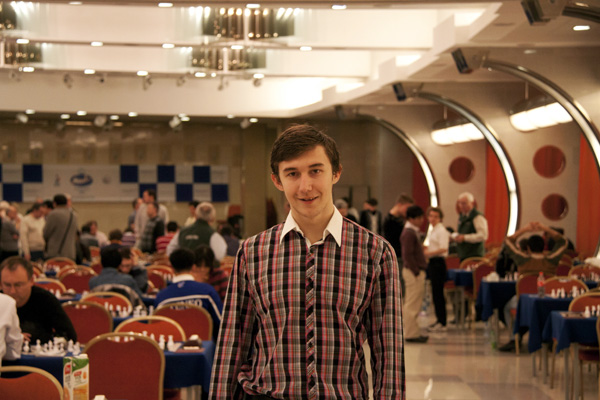
2013. Deathbed of classical chess
Alas, the Aeroflot tournament situation would not improve at that time. The Board of the Russian Chess Federation, headed by Ilya Levitov (now the owner of the popular YouTube channel Levitov Chess and organizer of the Levitov Chess Week super-tournament in Amsterdam), declared that no one was interested in the tournament in the existing format, so revolutionary reforms were needed to breathe new life into the festival.
The RAPID Grand Prix series was born as the RCF management actively promoted rapid and blitz tournaments. It was at that time that the idea of holding the Aeroflot Open with a short time control was born.
At the RCF coaches meeting at the end of 2012, most of the young coaches were in favor of speeding up the game, and one even claimed that no long-time formats would survive in the next ten years. There would be a shrug of the shoulders from the veterans, but no major objections to the new time format. Incidentally, 10 years have passed and we are still waiting to see the funeral of the classical chess!
The venue of Aeroflot Open -2013 was InfoSpace exhibition center. The entry fees were symbolic, while the competition formula was quite complex. It all started with an all-comers qualifier with 15 minutes + 10 minutes per move; 32 winners advanced to the knockout tournament with a minimum prize of one thousand dollars guaranteed.
The next day it was a massive Blitz tournament with the invited stars (Alexander Grischuk, Peter Svidler, Dmitry Andreikin, Sergey Karjakin, Ian Nepomniachtchi, Wang Hao, Shakhriyar Mamedyarov, and Anatoly Karpov) and a prize fund of $50,000, with $10,000 going to the winner.
Next on the schedule was a knockout tournament featuring 32 winners of the Rapid qualifier. It featured two games, followed by Armageddon in the event of a 1-1 draw! The 9th through 16th place finishers received $1,500 each, the 17th through 32nd place finishers received $1,000 each, and the lucky eight who made it through two rounds would move into the main final to join the top finishers from the Blitz event. Everything interesting began from the round of sixteen!
The prize pool for Rapid was $72,000, with the winner taking home as much as $16,000. The festival featured live broadcast of the top 16 games, commented by famous GMs who came to the studio to Sergey Shipov and Ilya Gorodetsky.
The spectators could also attend lectures on chess theory, take part in master classes by leading Russian grandmasters and trainers, and take part in simuls. In addition, special events were organized for the children of Aeroflot employees.
Those who came to the additional program could spend hours listening to the lectures of legendary coach Mark Dvoretsky, enjoy the best puzzles composed by the great Oleg Pervakov, learn more about the Dragon Variation from one of the leading Moscow coaches Vladimir Vulfson, and much more.
As a result, Ian Nepomniachtchi finished first in Blitz, and in Rapid he lost in the semi-finals to Sergey Karjakin. The latter advanced to face Alexander Grischuk in the deciding match. At the end of regulation time the score was 1-1. The "game of death" was a real drama.
Karjakin – Grischuk

51.Rd2?
51.Qc8+ Kh7 52.Qf5+ Kh8 53.d7 an easy win, but both opponents' clocks displayed only seconds at that moment…
51...Re6+! 52.Kd3 R:d6+ 53.Ke2
It turns out that 53.Ke3 Re6+ 54.Kd3 Qd8+ 55.Kc3 Rc6+ even loses the game, and Karjakin tries his one last chance. He gives up the queen, hoping that Grischuk will not make it in time with the remaining moves before move 60, when the time increment begins.
53...Re6+ 54.Qe4 R:e4+ 55.fe, and it was at this moment that Grischuk's clock displayed zeros, while White still had two seconds left.
Let me remind you that just before New Year 2013 the tournament "Piterenka-2012" took place in the Central Pedagogical University. At stake for outstanding grandmasters to grab was a plot of land in the elite district. The battle for first place also witnessed Armageddon between Grischuk and Karjakin. Grischuk seemed to be haunted by an evil fate, and in a winning position he walked into a "mad" rook trap!
The picture shows Sergey Karjakin wearing the clothes of his then sponsor Alpari, which at that time launched a big PR campaign called "Let's bring the chess crown back to Russia! And it must be said that the crown almost returned.
2015. Another take-off
The year 2014 turned out to be very challenging both in chess and in all other areas - many people had no time for chess. Exchange rates fluctuated and prices in shops increased. Unfortunately, the next Aeroflot Open did not take place in such a situation. The leadership of Russian chess also changed - according to the new law, government officials could no longer be presidents of sports federations, and Deputy Prime Minister Arkady Dvorkovich handed over his position to businessman Andrey Filatov, known for his brilliant organization of the Anand-Gelfand match at the Tretyakov Gallery (2012) and the great Alekhine Memorial in Paris and St. Petersburg (2013).
Mark Glukhovsky, previously editor-in-chief of “64 – Chess Magazine”, became the new Executive Director of the Russian Chess Federation. Glukhovsky started working as a journalist at the Aeroflot Open in the days of A. Roshal. He was on good terms with Alexander Bach and together with Evgeny Atarov published a book about the first tournaments of the festival. Naturally, the new director made every effort to revive the festival, which was once again held at the Cosmos Hotel. In addition, the Aeroflot Open became a stage of the Russian Cup. It fitted well in the calendar of domestic tournaments.
Russian players dominated in the classical chess - Ian Nepomniachtchi landed ahead of Daniil Dubov over additional tiebreakers. Dubov's star was also beginning to rise rapidly. Third place went to the young Ivan Bukavshin. The numerous successes of the Togliatti player showed him to be a future elite chess player, but a terrible thing happened - a year later Bukavshin died under circumstances that defied even investigation. Autopsy results stated that his body somehow got a fatal dose of No-spa...
Vahe Baghdasaryan (Armenia) and Irina Utyatskaya (Russia) took the first place in the "B" and "C" tournaments, respectively.
A scandal with a very peculiar subtext was also part of this tournament. It happened in a game between Pavel Dvalishvili, the chess legend of the capital city, and his Azerbaijani colleague Orkhan Abdulov.
The game was very tense from the first moves. With two rounds left in the side tournament, both opponents had +2, and the winner had a chance to win one of the main prizes of several thousand euros, while the loser had to fight for the crumbs in foreign currency. Dvalishvili later claimed that the Azerbaijani player had behaved in a bold and defiant manner from the very first moves. Abdulov defended himself by saying that Pavel prevented him from thinking in every possible way, such as by writing down a move and trying to show him a scoresheet before making a move in an attempt to see his reaction. Dvalishvili, in turn, took the ID card of a visually impaired person from his pocket to claim that he had never had such thoughts.
This confrontation was preceded by the following: Abdulov's position turned out to be absolutely lost (and it was still far from the time control move - Black did not get out of the opening), but at the same time the Azerbaijani master had appealed to the arbiters several times about Dvalishvili writing a move on the scoresheet before making it. Following yet another such episode, he demanded that his opponent's game be forfeited. The arbiters gathered together in a hurry, the game was stopped, and the partners were escorted out of the playing hall. The participants could only guess what happened next from the shouts they heard. Soon, the chief arbiter Geurt Gijssen arrived as well, to whom they started to translate from the Russian into the English language and to explain the essence of the problem. And Gijssen, in full accordance with the rules in effect at the time, awarded a loss to Dvalishvili.
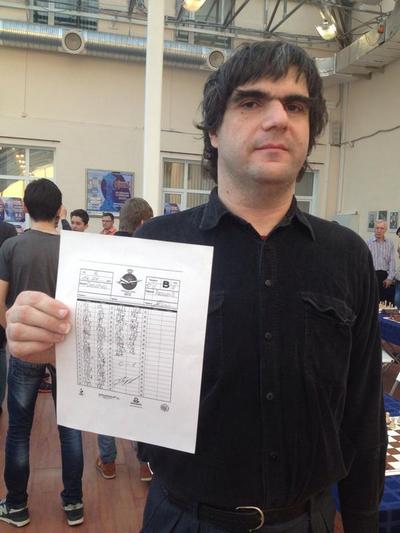
As a result, Abdulov won the last game and finished 4th, while Dvalishvili clung to the last "Aero" bonuses.
"Dvalishvili's opponent appealed and for the first time Dvalishvili was warned by the arbiter. Nevertheless, Dvalishvili continued to do the same. Then the arbiter added two minutes to Dvalishvili's opponent. And when Dvalishvili recorded the move for the third time before making it, his game was forfeited. As a result, he was given two warnings before the game was forfeited," the chief arbiter wrote in a commentary on the situation for the Russian Chess Federation website.
In the main event, young Jorden van Foreest, whom Nepomniachtchi called the scythe-wielding Horseman of the Apocalypse in the closing interview, played well. Jorden was sick, coughing and sneezing. However, he did not want to quit the tournament in those romantic pre-Covid days. But his opponents did! (The author remembers Harika Dronovalli coming barefoot in those frosty February days. She sneezed so much during their game that he had to put the pieces back on the board after each such outburst). But the experienced Ian had already stocked up on powders, pills, blends and tablets: having managed to resist the illness, he continued to play and even won! And the win below put him in first place.
Nepomniachtchi – Sasikiran
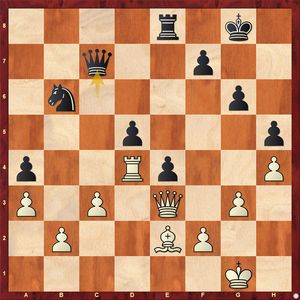
Black's pawns are weak. But how to take them without allowing any counterplay? Ian planned an amazing maneuver. He moved the king to a2 to consolidate the queenside!
37.Kf1! Re6?
Instead of this slow move, Black should have launched counterplay right away : 37...Qc8 38.Ke1 Qh3!
38.Ke1 Rc6 39.Kd1 Rf6 40.Rb4 Rc6 41.Kc2 Kh7 42.Qd4 Re6 43.Qe3 Qd6 44.Kb1 Qc7 45.Ka2
Black is paralyzed, and now Nepomniachtchi moves on to reap the harvest.
45…Rc6 46.Qd4 Re6 47.Bd1 e3
Hopeless is 47...Qc6 48.B:a4, and Krishnan's attempts to muddy the waters by ditching other pawns are of no avail either.
48.fe Qd6 49.Bc2 Qc7 50.Bb1 Kg8 51.Bd3 Nd7
Or 51...Qc6 52.e4, winning easily.
52.Q:d5 Rd6 53.Qb5 Kg7 54.R:a4, and White went on to win.
Nepomniachtchi had a double success - he also won the Blitz that year, but an incident happened to him on the way. Ian came to his blitz game against Grischuk with his phone, which began to vibrate at the decisive moment. That is, the GM turned off the sound, but not the phone itself. There is a fight going on, everyone is watching - spectators, arbiters, and commentators. The phone vibrates, its owner incredibly nervous, though the reason is unclear to those around him. As a result, Ian blundered his rook and lost the game! But he left the playing hall during the break to get rid of his biggest problem, and ended up winning the tournament by a huge margin.
The Aeroflot Open continued to delight Russian chess players and festival guests for yet another five years. The geopolitical landscape changed. As a result, European chess players began to travel to Aero much less frequently, which was compensated by Asian players starting to arrive. In the main tournament, the 2550 level became more formalized each year. They would admit talented young players to give them a chance to gain experience. There is no doubt that the number of interesting and instructive stories connected with Aeroflot will increase in the coming years.
Photo credit: Boris Dolmatovsky, Vladimir Barsky and Eteri Kublashvili
To be continued.









